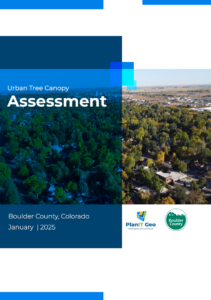Boulder County has collaborated with PlanIT Geo, a global urban forestry software development and consulting firm based out of Arvada, Colorado, to conduct a comprehensive analysis of existing tree coverage and opportunities for expansion across Boulder, Erie, Lafayette, Longmont, Louisville, Lyons, Superior, and the urbanized areas of unincorporated Boulder County.
Urban Tree Canopy Assessment

Boulder County’s Urban Tree Canopy Assessment is available to view and download here. Additionally, PlanIT Geo developed an interactive tool, called CANOPY, which integrates geospatial and EnviroScreen data to help communities make informed, data-driven decisions about urban forestry management.
Key Takeaways
The assessment highlights areas with the greatest need for tree planting, which were selected by considering environmental, socioeconomic, and demographic factors. Additionally, the assessment includes methodology and findings for canopy change tracking, ecosystem benefits assessment, identification of disproportionately impacted (DI) communities, heat mapping, and wildfire risk analysis.
Findings from the report show a 0.7% canopy increase from 2013 to 2021, with 47% of county land suitable for tree planting. Based on these findings, the report suggests a goal of reaching 25% canopy coverage by 2050. This recommendation falls within the Colorado State Forest Service’s recommended 20-30% range for Front Range communities.
About Urban Tree Canopy
Urban tree canopy refers to the layer of leaves, branches and stems of trees that shelter the ground when viewed from above. Tree canopy coverage is tied to several positive outcomes for communities, both scientifically and culturally.
For example, as Colorado faces increased frequency and intensity of high-heat days, boosting tree coverage and shade helps keep neighborhoods cooler. Additionally, robust root systems and leafy coverage can limit the severity of damage from heavy rain events, including flooding. Finally, trees have also been tied to happier and safer communities, decreasing speeding from vehicles, providing shelter for wildlife, and even increasing property values.
Contact Us
Dede Croissant, Project Lead
Office of Sustainability, Climate Action, and Resilience
PO Box 471
Boulder, CO 80306

